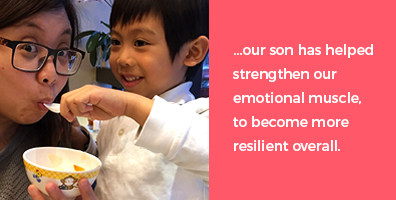MY SON, MY GIFT
Parenting a Child with Autism
The holiday season is in full swing with advertisers competing for our gift-giving dollars. While gifts can certainly be lovely and fun and meaningful, the greatest gifts we receive in this lifetime come in the form of other people. P4P invited one of our very own team members to share a little about her all-time favourite gift, her son Ian.
P4P: Tell us a little about your son.
CM: Ian is now five years old, and he is very bold person, very loud and direct. His extroverted personality differs quite a bit from that of his father and I. He often takes himself quite seriously, things can be black and white – although, last week we were really surprised when he lied to us for the first time, which was funny but also a bit heartbreaking like, “Oh noooo, he’s lied to us!” [laughter]. On the flip side, when he loves something he doesn’t hide it, you can hear him laughing from a block away.
P4P: How are you helping him explore his natural gifts and talents?
Our son has inherited his father’s love of music. One day when Ian was a toddler we took him to the Ontario Science Centre where he overheard a song playing. A year later, in a movie theatre, a soundtrack came on and Ian started excitedly whispering “Science Centre! Science Centre!” We were mystified as to his random excitement – until we realized we were hearing a remixed instrumental version of the same song by the same artist, from the year before.
Recently we enrolled him in piano lessons, which he loves. Most kids don’t come home from school, put down their backpack and run straight to the piano, but Ian does. The keyboard we got him comes with different sound effects and lately he’s very into making super loud rock music. It’s really something to watch him jamming out, to see him express himself this way. Ian has always been very creative, or what you might call 'experimental'.
P4P: Care to share an example?
Sure. So, as a toddler, he was into using “found objects” throughout the household for different projects. One day he gathered up various kitchen gadgets to build his own music concert stage. He then had his dad and I move around with flashlights to mimic spotlight effects while he rotated the stage and sang songs to create, like, a full-scale performance.

Resilience in Action
P4P: How has parenting your little boy changed you?
P4P: How were things in the early days of your son's diagnosis?
I used to spend a lot of time crying and kept asking our ASD therapist, “Why is he doing this or that again, he doesn’t sleep, he doesn’t talk, he screams, he so angry with me, I really hate this” and I would feel guilty. And she said “Okay you hate it. But what is it you really hate? If Ian was magically without ASD, would you still feel hate?” I said, “No, of course not.” And she said, “See? What you really hate is the ASD, not your son, and the ASD is something that you can deal with.” It completely opened my mind.
Before we had our son, life was all “rush, rush, rush” and you should do this or must do that. Ian is teaching us to take things slowly, one step at a time – not just with raising him, but with life in general, our son has helped strengthened our emotional muscle, to become more resilient overall.
Ian helped us to realize that maybe we can do more to help other parents by encouraging them to have their kids diagnosed as early as possible, because early intervention can be really beneficial, it has been for us. Sometimes parents either don’t want the label and so avoid a diagnosis, or when they do realize that there is some sort of behavioural problem, they push it away, hoping it will magically disappear. Especially within my community, the Asian community, I hope we can become more open about it, help remove the stigma.
To this day, I haven’t let that go. Fortunately, though, we have a whole team of very supportive professionals including many other doctors, therapists, case managers and support workers – who all continue to encourage and remind us, every step of the way, to focus on what Ian can do.
Keep a Calm Box and Carry On
P4P: What do you want people to know about your son?
It is true that our son is different from other kids, and certain of his behaviours or a particular personality trait can be quite intense. Yet, it is also true that all kids are different from each other, that they each have their own challenges, at times, around things like sharing or jealousy or learning boundaries.
So, for example, one of Ian’s teachers helped us prepare a “calm down box” for him. It contains books and bubble wrap and a fidget spinner and other items which Ian knows are meant to help him work on his more uncontrollable tantrums. Last week, when one of Ian’s classmates was having a total meltdown he walked over and said to him, “It’s okay, it’s okay … here, look, do you want this box? Do you want this book? It can help you to calm down.” His teacher and father and I were so proud of him for this. At the same time, we cherish and accept Ian’s differences.






